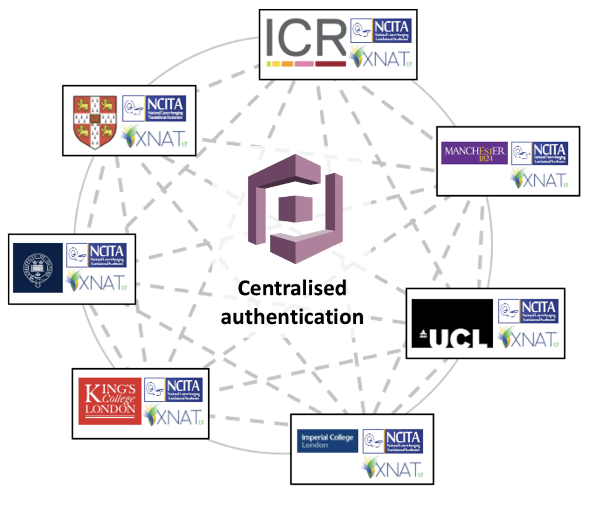Vision Statement
‘To create and sustain a state-of-the art national repository of cancer imaging data that provides infrastructure and tools for biomarker discovery, development and validation and that will lead to precision oncology’

In 2020, the NCITA Repository Unit created their a vision statement outlining ambitious aspirations for their XNAT programme. As shown in the diagram, XNAT sits at the centre of the imaging study lifecycle and can contribute at every stage. The modern concept of a Repository is far more than simply a “shopping trolley” from which images can be downloaded.
Work Package Achievements and Progress
Applications technology (WP1): We have taken advantage of NCITA’s leading position as the creator of the XNAT integration of the zero-footprint Open Health Imaging Foundation (OHIF) web viewer in order to develop state-of-the-art tools for visualising data in multicentre studies. Successes so far have been: (i) the implementation of flexible ROI delineation tools, with the results stored in industry-standard, machine-readable formats ready and stored back in the Repository, ready for downstream applications to access them programmatically; (ii) AI-assisted image annotation for segmentation; (iii) advanced 4-D image display options; (iv) a web-based viewer for digital pathology. We have also developed containerised “shrink-wrapped” processing pipelines to facilitate data analysis and, in particular for calculation of quantitative imaging biomarkers.
XNAT federation (WP2): There are understandable reasons (for example information governance, cybersecurity and intellectual property concerns) why individual institutions may wish to domicile within their own jurisdictions (i.e., on their own servers) any imaging data that they generate. This mitigates against a single national-scale research archive, thus making it hard to create subject cohorts that combine data from multiple institutions. To address this, NCITA came up with an innovative solution by creating “Repository nodes” that are managed independently at each institution. The nodes operate with a common SOP framework and a technical solution for linking the databases, allowing institutions to retain complete control of their own data and can take advantage of local infrastructure. During the initial phase of NCITA funding, much progress was made towards this goal, with well-established Repository Unit nodes at ICR, Cambridge, Manchester, Imperial and UCL. In addition, we developed a unique XNAT federation concept, based on the OpenID standard, with a common centralised authentication, enabling a single researcher to search simultaneously across multiple XNATs. For our first test system, we investigated AWS Cognito and demonstrated the validity of this idea.

Development of new infrastructure (WP3): Over the last five years, significant work has been performed on the underlying physical and software infrastructure of the NCITA XNAT platforms. We have developed both our user-onboarding methods and our capabilities in image deidenfication to enable us to run numerous multicentre trials with large numbers of collaborating institutions.
FAIR data access (WP4): Over the coming years, the ability to make our data Findable, Accessible, Interoperable and Reusable will be key to developing informatics workflows. Systematic incorporation of more study-level metadata into all studies will improve findability, while the technical work we are doing will enable interoperability and reusability. We are working closely with information governance teams to examine our procedures for access to both clinical trial data, where patients have given informed consent for onward research use of their data, and “real-world” data, for which the NHS is moving towards the use of Trusted Research Environments (TRE) or Secure Data Environments (SDE).
Compliance (WP5): In parallel with our technology upgrade, we have introduced data audits, redesigned our training procedures and created a Data Protection Impact Assessment (DPIA). We have also piloted a cloud-based hospital installation at one of our partner institutions, the Royal Marsden, and have taken it through the entire process of high- and low-level design documentation and institutional approval. We have undertaken a project to perform security hardening of our XNAT servers to CIS-Ubuntu Level 1 and these have successfully passed penetration testing.
Sustainability (WP6): We are working towards making the Repository sustainable financially. Our goal is to maintain core staff to deliver Business As Usual services to academic users for fees significantly less than typical medical Contract Research Organisations (CROs), whilst continuing to operate our research activities through funded projects.
Outreach and education (WP7): Our NCITA Repository Unit Team have actively engaged in both outreach and education. Dr Lorena Escudero Sanchez, (University of Cambridge) has been instrumental in organising a number of public events, for example “coffee and AI” as well as an excellent display at the Alan Turing Institute’s 2023 AI-UK Conference. Dr Simon Doran (ICR) was a key member of the planning team that organised the XNAT workshops 2021 and 2022. The Repository Team also developed a video training course for the XNAT OHIF viewer v3.

Support (WP8): The Repository Unit has provided support for more than 30 multicentre studies, including NCITA exemplar projects, NCITA adopted studies and institutional projects.
The Repository Unit consists of a federation of institution-based XNAT nodes, each of which hosts a subset of the image data. The ICR/RMH XNAT Repository and UCL XNAT Service host the nodes at these two institutions and these websites contain lots of additional information on our activities.

